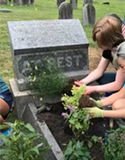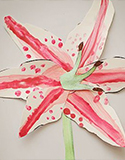ABOUT / CONTRIBUTORS / CONTACT
Activities are an important component of horticultural therapy (HT) and therapeutic horticulture (TH) programs, where intentional connections to living plants are an essential element. Horticulture activities can be a great asset to all caring professions and are unique in that they rely on living materials. The activities found here in the Therapeutic Horticulture Activity Database (THAD) have been developed or adapted by HT professionals and can be adapted and implemented by a broad range of practitioners. Although most of the activities in this database use living plants, there are also some that are not specifically plant-based. While not technically therapeutic horticulture activities, they are included as nature-based activities and additional opportunities to stimulate the interest in integrating plants into practice.
THAD uses three primary categories to present and organize activities: Activities, Goals, and Populations which can be accessed by clicking on the buttons below. Each primary category will contain related sub-categories which further divide activities. Both the primary and sub-categories are listed at the top of the activity page.





